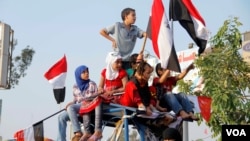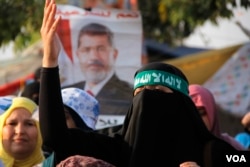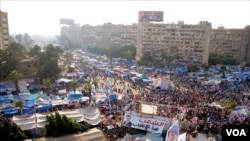CAIRO —
At protests in Cairo, children often lead chants or are seen riding on their parents' shoulders with Egyptian flags painted on their cheeks. And while international organizations warn that children are in danger at volatile political demonstrations, parents say they want their children to grow up understanding what it means to stand up for their rights.
In this tent, a few children play among about a dozen women - many who have been here for a month along with thousands demonstrating for the reinstatement of ousted President Mohamed Morsi.
With no men around, Umm Henna, the mother of four-year Henna and baby Nouran, flips the veil off her face to chat while her children grab playfully at the microphone.
She said earlier in the day tanks pulled up outside the protest camp. While her husband joined the other men preparing to confront the tanks, she scooped up the kids and ran barefoot toward the mosque in case things turned violent.
Still, she said the danger is a welcome sacrifice to teach her children how to stand up for their rights.
But human rights groups say children are being put in harm's way and the interim Egyptian government says some protesters are using children as shields.
Egypt’s military-led interim government has repeatedly ordered protesters to abandon sit-ins organized by the Muslim Brotherhood in support of Mr. Morsi.
People both in and outside the demonstrations fear that if authorities try to dismantle camps by force, hundreds more will be killed in the struggle.
In flyers dropped on the camp this week, Egypt’s Ministry of Interior accused protesters of keeping children at the demonstrations to prevent opponents from attacking.
Cairo-based Human Right’s Watch researcher Heba Morayef says demonstrations are dangerous for children, regardless of their political leaning.
“We’ve seen hundreds of children," she said. "I think the total is over 1,100 if you look at the overall number of children that have been arrested over the last two-and-a-half years. In some cases children have been injured. Children have been shot. Children have been killed as a result of this violence.”
If authorities try to forcefully clear demonstrators fromareas like the pro-Morsi camp near Rabaa Adiweya Mosque, Morayef says, both the protesters and the government must bear responsibility for keeping the children safe.
“Especially in the case of Rabaa where there would be clear risks both in terms of stampedes once the use of force actually starts, either asphyxiation because of tear gas or being caught up in gun battles,” she said.
Protests have come to define modern politics in Egypt, where two heads of state have been pushed out office in two and half years.
Wael Khalil is a veteran activist who advocated for the ouster of Mr. Morsi and of Hosni Mubarak in 2011. He says protests in Egypt have always been a family affair.
“Actually the nature of our protests, I mean the anti-Mubarak protests in 2011, the main characteristic of it was how families come together and most of the protest afterwards," he said."So I cannot condone it for us and prevent it for them. I don’t think it’s sinister in any way.”
In Rabaa, mothers say they know their children could be in harm’s way but they believe their cause is worth fighting and dying for.
But some children in Rabaa say they feel safer in the protest camps - surrounded by their community and dozens of men with sticks and hard hats - than they do at home.
In this tent, a few children play among about a dozen women - many who have been here for a month along with thousands demonstrating for the reinstatement of ousted President Mohamed Morsi.
With no men around, Umm Henna, the mother of four-year Henna and baby Nouran, flips the veil off her face to chat while her children grab playfully at the microphone.
She said earlier in the day tanks pulled up outside the protest camp. While her husband joined the other men preparing to confront the tanks, she scooped up the kids and ran barefoot toward the mosque in case things turned violent.
Still, she said the danger is a welcome sacrifice to teach her children how to stand up for their rights.
But human rights groups say children are being put in harm's way and the interim Egyptian government says some protesters are using children as shields.
Egypt’s military-led interim government has repeatedly ordered protesters to abandon sit-ins organized by the Muslim Brotherhood in support of Mr. Morsi.
People both in and outside the demonstrations fear that if authorities try to dismantle camps by force, hundreds more will be killed in the struggle.
In flyers dropped on the camp this week, Egypt’s Ministry of Interior accused protesters of keeping children at the demonstrations to prevent opponents from attacking.
Cairo-based Human Right’s Watch researcher Heba Morayef says demonstrations are dangerous for children, regardless of their political leaning.
“We’ve seen hundreds of children," she said. "I think the total is over 1,100 if you look at the overall number of children that have been arrested over the last two-and-a-half years. In some cases children have been injured. Children have been shot. Children have been killed as a result of this violence.”
If authorities try to forcefully clear demonstrators fromareas like the pro-Morsi camp near Rabaa Adiweya Mosque, Morayef says, both the protesters and the government must bear responsibility for keeping the children safe.
“Especially in the case of Rabaa where there would be clear risks both in terms of stampedes once the use of force actually starts, either asphyxiation because of tear gas or being caught up in gun battles,” she said.
Protests have come to define modern politics in Egypt, where two heads of state have been pushed out office in two and half years.
Wael Khalil is a veteran activist who advocated for the ouster of Mr. Morsi and of Hosni Mubarak in 2011. He says protests in Egypt have always been a family affair.
“Actually the nature of our protests, I mean the anti-Mubarak protests in 2011, the main characteristic of it was how families come together and most of the protest afterwards," he said."So I cannot condone it for us and prevent it for them. I don’t think it’s sinister in any way.”
In Rabaa, mothers say they know their children could be in harm’s way but they believe their cause is worth fighting and dying for.
But some children in Rabaa say they feel safer in the protest camps - surrounded by their community and dozens of men with sticks and hard hats - than they do at home.







